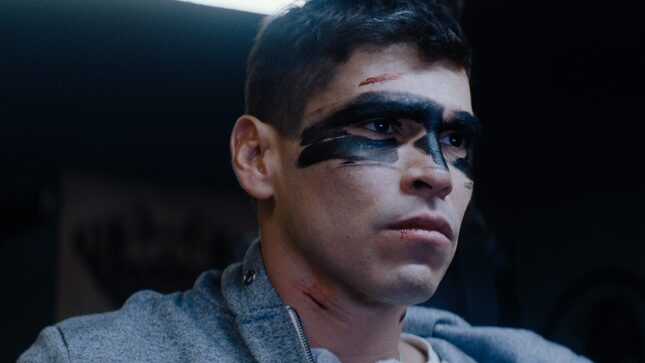
Of all the aesthetically interchangeable superheroes, I find Batman to be the most likable, because he doesn’t fit the quintessential mold of what a superhero should be. Unlike Spider-Man and Superman, Bruce Wayne is the most compelling, as a normal human who uses the riches at his disposal to mold himself into an elevated species, and then opts to use that power for good—rather than spy on his icons or steal penguins from the zoo (as I would). Still, the reason he can go from heroic human to superhero is wealth.
El Chicano’s director Ben Hernandez Bray once said he could never relate to “a billionaire white boy who worked out of a cave.” In this case, what makes Diego Hernandez (played by Raul Castillo) super aren’t supernatural gifts or even the power or tools that wealth can bring, but rage set aflame by injustice and crime in his community. “Remember, remember always,” Hernandez reads from his late twin brother Pedro Hernandez’s notes while in jail, “that all of us, and you and I especially, are descended from immigrants and revolutionists.” The Franklin D. Roosevelt quote serves as the unifying theme for the film—and sparks a flame in Diego.
In order to avenge Pedro’s death and protect his city, Diego takes on the role of the violent masked hero he and his brother grew up chasing.
Set in East Los Angeles, El Chicano is about twin brothers whose paths go in different directions, only to then fiercely intertwine after one of them passes. Pedro opted for a life of crime from a young age, whereas Diego—much to his mother’s disappointment—became a detective. In a mysterious death ruled a suicide, Pedro (whose adult self is almost never visible in the film, but is key to the plot’s unfolding) has his life cut short before getting to take on the role of protector. Yet, his studies on the art of war and revolution while imprisoned, along with other tools and clues that helped Diego understand his perspective in life and true cause of death, are left in good hands.
The breadth of the film, though, seems to be the multi-generational responsibility of fighting for what’s right. Both brothers want the same thing: for their city and people to be empowered and for justice to be served—they just go about it in very different ways. After several dead bodies are discovered in an abandoned space in the city, Diego is assigned a life-altering case linked to a cartel based in Mexico. He soon realizes his childhood friend, who goes by Shotgun, is both involved in a complicated, political turf war and responsible for his brother’s murder. In order to avenge Pedro’s death and protect his city, Diego takes on the role of the violent masked hero he and his brother grew up chasing.
El Chicano is a new kind of hero—the transformation required no physical change (one night with a punching bag did the trick), only a shift in perspective. The call to action isn’t to violently take matters into his own hands; it’s to embrace the generational power he holds and use it to fuel change. In the landscape of superhero films, El Chicano doesn’t come across as a movie seeking to compete with others in the genre, nor does it position itself as a Latinx iteration of Black Panther. The movie instead attempts to challenge the portrayal of Latinos in movies like this—the criminals are Latinos, but so are the vigilante, the detective, and the cop. (Though, as several critics have pointed out, the pitting of Mexican “invaders” versus Mexican-American good guys is undermining.) “The ghetto grim reaper,” as Captain Gomez (George Lopez) calls the violent avenger, could be anyone and everyone. In sharp contrast to his last two projects, Castillo shows his versatility and potential as an action star, while Aimee Garcia, Jose Pablo Cantillo and vets like George Lopez, Emilio Rivera, and (in a blink-of-an-eye appearance) Kate del Castillo play supporting roles.In its effort to cater to the tropes of cartel films, El Chicano misses an opportunity to divert from stereotypes that are commonly depicted in Anglo films, leaving it feeling unfortunately cheesy at times. With lines like, “Don’t be out in the dark in the barrio,” and references to “voodoo Mexicana bruja shit,” plus instances in which Diego seems to be protecting “American soil” rather than fighting for the unification of his people—the film often leaves itself vulnerable to misinterpretation.
At face value, the relatable, less refined hero film isn’t trying to be anything but itself. Its all Latin-cast, paving the way for others yet deeming it unworthy of Hollywood’s support, is also a win, in that they still got it done. But in promoting this as a “superhero” film (when it really is not) and releasing it in the same week as Avengers: Endgame, the team behind-the-scenes dug their own grave.
Kate del Castillo’s cameo may very well be a sign that a sequel more deeply ingrained in the drug cartel storyline is a future possibility. Perhaps the magnificent La Reina del Sur is her main priority right now? Who knows. But the rollout, producer’s messy response to criticism, and generally controversial thematic elements of the film—is a lesson for all. The last God-knows how many years of limited roles for Latinx people in films have perhaps unconsciously limited storytellers’ imaginations and view of what an all-Latin cast could mean. As we continue to challenge the way we’re reflected in art—hopefully continuing to take the wheel, backseat, and passenger seats—it’s key to not feed into convention but rather explore all that could be.
El Chicano is currently playing in theaters.